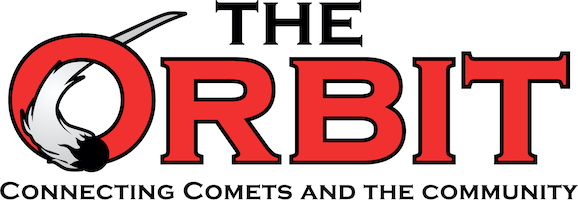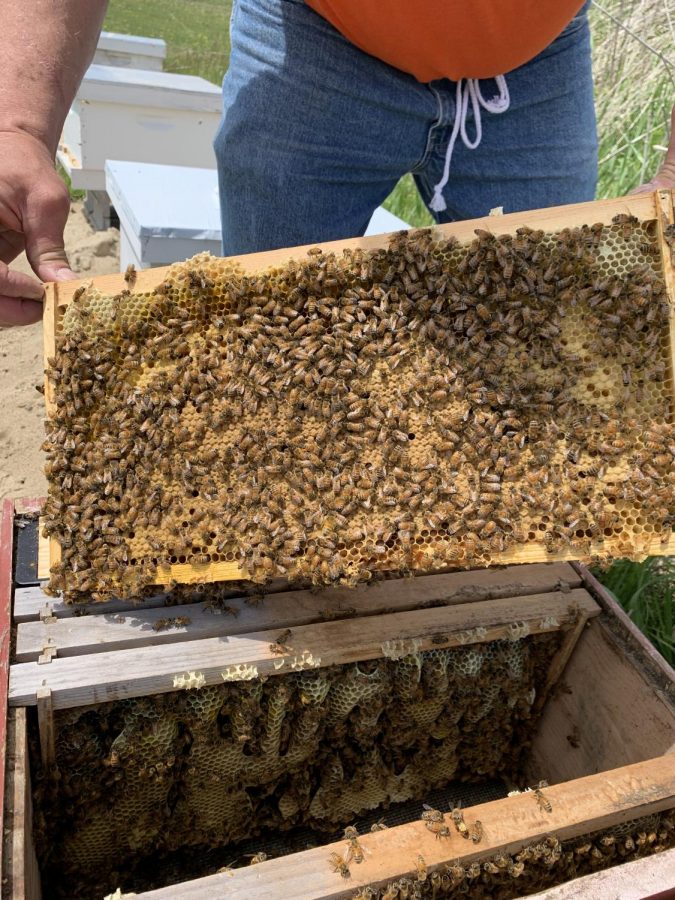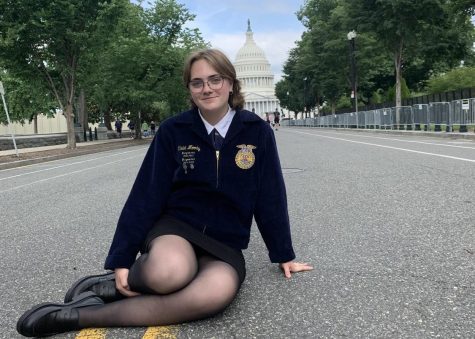Benefits of Bees
Beekeeping at Schools
Busy Bees: During the summer months beehives are occupied with collecting pollen, taking care of their larva and making honey.
October 6, 2021
Almost all natural food that humans consume has been pollinated by bees. With the bee population decreasing, it is important that the practice of keeping bees, as well as educating students about the pollinators, increases.
Having bees at the school would be a great opportunity for agriculture and biology classes to learn about the importance of pollinators.
Science teacher, Aaron Dose, is excited at the possible opportunity to have bees at the school. “Bees offer great insight into the fragile balance of ecosystems. Students can learn about the process in which bees pollinate, make honey, and reproduce,” responds Dose.
Science teacher, Kim Kult, also supports having beehives at the school. While she has minimal experience with beekeeping, Kult knows that bees are ecologically vital when it comes to pollinating.
“I think that anything that educates students more about that ecological role is a good thing,” adds Kult.
Agriculture teacher, Jessica Hebert, has had an interest in putting beehives at the school for quite some time. She has recently integrated pollinators into her agronomy, horticulture and animal science classes.
Hebert would use the beehives to “ Observe behavior, care and management of the hives, collection of honey, and common misconceptions of honeybees and the hives.”
While some people may find beehives near children concerning, due to possible bee stings or swarms, all of the teachers agree that the positives outweigh the negatives. Hebert believes that students can learn the basics of beekeeping, as well as responsibility and trying something new and possibly scary.
Hebert also notes that “Any chance kids can see first-hand something that relates to agriculture and where their food comes from is so important. Challenges are going to be encountered in everything we do. This is a great way to help kids learn how to handle the process of something new along with being able to see something through from start to finish.”
Ellie Nusbaum is the Central Iowa Honey Queen and the co-president of the Ames High School Bee Club. She helped build her school’s bee club up from the ground.
Starting with a fundraising with local honey, the club was able to get enough money to purchase pollinator hotels. Pollinator hotels are used as shelter for native bees that are not a part of a hive.
To take the club to the next step, Nusbaum explained how she wrote a grant requesting $2,000 to the Iowa Honey Producers Association, and it was quickly approved. The grant also provided the club with a bee mentor, Jamie Beyer, who is now sharing his knowledge and experiences on beekeeping.
The club started out with three hives and now has two to take care of. Nusbaum explained the process that they go through yearly to take care of the hives, “depending on the season, we check the hives weekly to monthly. After harvesting the honey, it is important to feed the bees with a 1:1 sugar syrup to prepare them for the winter.”
With the hives located a couple blocks away from the school, students are able to sign up to view the hives, and family and friends are always welcome!
While Ames High School does not have any classes directly tied to pollinators or beekeeping, the school has recently added an animal science class, which is taught by the bee club’s advisor, Emily Lair.
Nusbaum describes her love for beekeeping, “I have learned again and again the importance of protecting our honeybees specifically because one-third of our food is grown thanks to bees and without them we wouldn’t be able to survive.”


